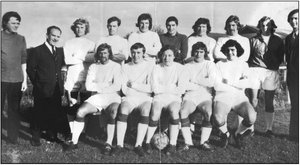
2. Part 2: The Middle Years: 1940-1980
As with many popular pastimes of the day, football was effectively disbanded as an organised sport from 1939-1945.
Many local men went and fought for King and Country at this time and the football club was once again well-represented by its players and committee in the armed services. Two players are known to have been killed in service during World War II. James Edward Brown, a regular for the Reserve team prior to the war, lost his life on HMS Edinburgh in April 1942. His ship was torpedoed by a German U-boat and 57 sailors were killed in the initial explosion. The ship itself was sunk not by the enemy, but instead scuppered by HMS Foresight, off the coast of Russia, to prevent a large shipment of gold falling into the hands of the enemy.
Horace Victor Goodall, Royal Armoured Corps, played both for Didcot Town and Didcot Wednesday and he lost his life fighting in Europe (Italy) in September 1944 aged 25.
Club records become more reliable following the War. A supporters club was formed in 1947, an Organisation that eventually had more than one thousand members, and they arranged various functions to support the growing club. Fred Goodall, was one of the supporters club’s first secretaries. Alongside him local politician Steve Freeman took charge of the club itself.
In 1952 the Reserve side was admitted to the First Division of the Oxfordshire Senior League and won the Championship moving up to the Premier League.
In the same season the club lifted the Festival Cup following a thrilling 6-4 victory against Harwell at Station Road on Boxing Day.
Throughout this era the club, like many, attracted unprecedented support with most games, including Reserve Team games, watched by many hundreds of spectators.
Season 1953-54 will always go down in history of one of the club’s finest. Entering the Hellenic League in its inaugural year Didcot Town claimed the title winning 22 of their 30 matches and scoring an impressive 107 goals in the process. The newly won Hellenic shield was soon proudly on-show in a glass case at the Marlborough Club, which the footballers used as their HQ.
This was undoubtedly a very fine Diddy side with at least two players, skipper Ray Warr and left-winger Pete Sanderson, turning down offers from professional clubs to say at Station Road.
Despite the large crowds and successful team, Didcot Town relied heavily on the financial stability earned by the thriving supporters club. Keeping a club solvent was as difficult then as it is now, with the Championship winning season showing a tiny profit of just 1s. 6d despite record crowds. Taking over from Goodall as secretary at this time was Stan Stockwell, a former player. His father, Fred Stockwell, was in the team that had won the North Berks Junior Cup in 1913 as was his step-father Bill Lewthwaite. Alongside his mother it was Fred Stockwell who played a large part in organising the fundraising.
By the 1955-56 season, and with the club’s teams progressing well in their respective Leagues, Didcot Town employed the services of Jeff Gulliver (ex-Leeds and Reading FC) as team manager. It is believed that Gulliver was the first ‘paid’ official at the club.
It was also about this time that Steve Freeman persuaded Mr Loyd to sell the freehold for the Station Road ground. It was a key point in the club’s history and one that eventually, more than forty years later, would pave the way for our relocation to Loop Meadow Stadium. As Freeman commented at the time: “In many years to come, our ground will be worth very much more than the £3000 we paid for it!”. He wasn’t wrong…
After four seasons in the Hellenic League, Didcot joined the Metropolitan League in 1957 (where they stayed until 1963) and had some success including reaching the League Cup Final in 1961/62. It was during this time that many famous footballers played against Diddy at Station Road, often representing the likes of Arsenal and West Ham Reserves. Amongst them a certain Geoff Hurst, who played at least twice at Didcot, something which he later recalled when he was a guest speaker at the Club in 2003.
In 1963 Didcot returned to the Hellenic League where it remained until promotion to the Southern League in 2006.
Didcot waited until the 1965/66 season to taste success again when they won the Premier Division Challenge Cup (Witney Town were defeated 3-2 in the final replay at the Manor Ground).
On Sunday May 28th 1967 the club celebrated its’ 60th year with a diamond jubilee match between present and past players. The ‘Didcot Past’ Team won 4-3 with Maurice Evans, Brain Thorne and Mick Burgess (2) grabbing the goals. ‘Didcot Present' replied with a brace from Mick Eldridge and one from Brian Gardener. Also the following season the Challenge cup was successfully defended but the club had to wait ten long years for further honours.
Indeed, the intervening years had seen Didcot demoted to Division One, but season 1976/77 not only saw a return to the Premier League as Div One champions (from Flackwell Heath) but also success in the Challenge Cup.
Pictured above right is the Diddy First team circa 1970's

